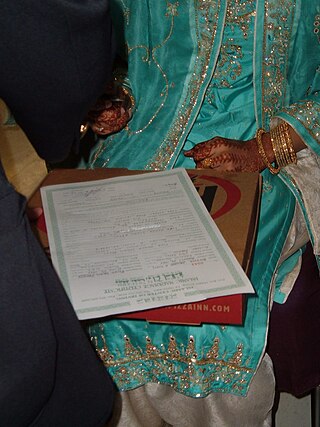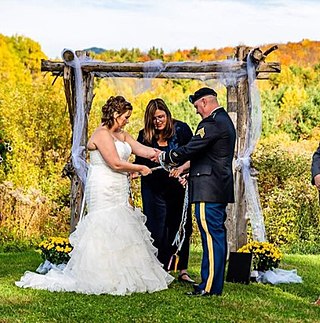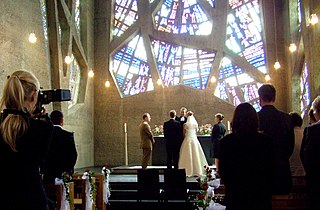
A civil marriage is a marriage performed, recorded, and recognized by a government official. Such a marriage may be performed by a religious body and recognized by the state, or it may be entirely secular.
A marriage license is a document issued, either by a religious organization or state authority, authorizing a couple to marry. The procedure for obtaining a license varies between jurisdictions, and has changed over time. Marriage licenses began to be issued in the Middle Ages, to permit a marriage which would otherwise be illegal.

Marriage vows are promises each partner in a couple makes to the other during a wedding ceremony based upon Western Christian norms. They are not universal to marriage and not necessary in most legal jurisdictions. They are not even universal within Christian marriage, as Eastern Christians do not have marriage vows in their traditional wedding ceremonies.

Same-sex marriage has been legal in Alberta since July 20, 2005 upon the granting of royal assent to the federal Civil Marriage Act. Alberta was one of the four Canadian provinces and territories where same-sex marriage had not been legalised before the enactment of the Civil Marriage Act, along with Prince Edward Island, the Northwest Territories and Nunavut.
The blessing or wedding of same-sex marriages and same-sex unions is an issue about which leaders of Christian churches are in ongoing disagreement. Traditionally, Christianity teaches that homosexual acts are sinful and that holy matrimony can only exist between two persons of different sexes. These disagreements are primarily centred on the interpretation of various scripture passages related to homosexuality, sacred tradition, and in some churches on varying understandings of homosexuality in terms of psychology, genetics and other scientific data. While numerous church bodies have widely varying practices and teachings, individual Christians of every major tradition are involved in practical (orthopraxy) discussions about how to respond to the issue.
Quaker weddings are the traditional ceremony of marriage within the Religious Society of Friends. Quaker weddings are conducted in a similar fashion to regular Quaker meetings for worship, primarily in silence and without an officiant or a rigid program of events, and therefore differ greatly from traditional Western weddings.

An Islamic marriage contract is considered an integral part of an Islamic marriage, and outlines the rights and responsibilities of the husband and wife or other parties involved in marriage proceedings under Sharia. Whether it is considered a formal, binding contract depends on the jurisdiction. Islamic faith marriage contracts are not valid in English law, nor American Law. Because of this, some Islamic Marriage Officiants will only officiate a marriage after the couple had been legally married in court.

Marriage is available in England and Wales to both opposite-sex and same-sex couples and is legally recognised in the forms of both civil and religious marriage. Marriage laws have historically evolved separately from marriage laws in other jurisdictions in the United Kingdom. There is a distinction between religious marriages, conducted by an authorised religious celebrant, and civil marriages, conducted by a state registrar. The legal minimum age to enter into a marriage in England and Wales is 18 since 27 February 2023. Previously the minimum age of marriage was 16, with parental permission. This also applies to civil partnerships.

An officiant or celebrant is someone who officiates at a religious or secular service or ceremony, such as marriage, burial, namegiving or baptism.

This article summarizes the same-sex marriage laws of states in the United States. Via the case Obergefell v. Hodges on June 26, 2015, the Supreme Court of the United States legalized same-sex marriage in a decision that applies nationwide, with the exception of American Samoa and sovereign tribal nations.

A marriage officiant or marriage celebrant is a person who officiates at a wedding ceremony.
Methodist viewpoints concerning homosexuality are diverse because there is no one denomination which represents all Methodists. The World Methodist Council, which represents most Methodist denominations, has no official statements regarding sexuality. British Methodism holds a variety of views, and permits ministers to bless same-gender marriages. United Methodism, which covers the United States, the Philippines, parts of Africa, and parts of Europe, concentrates on the position that the same-sex relations are incompatible with "Christian teaching", but extends ministry to persons of a homosexual orientation, holding that all individuals are of sacred worth.
Common-law marriage, also known as sui juris marriage, informal marriage, marriage by habit and repute, or marriage in fact is a form of irregular marriage that survives only in seven U.S. states and the District of Columbia along with some provisions of military law; plus two other states that recognize domestic common law marriage after the fact for limited purposes.
The Supreme Court decision in Obergefell v. Hodges that legalized same-sex marriage in the states and most territories did not legalize same-sex marriage on Indian reservations. In the United States, Congress has legal authority over tribal reservations. Thus, unless Congress passes a law regarding same-sex marriage that is applicable to tribal governments, federally recognized American Indian tribes have the legal right to form their own marriage laws. As such, the individual laws of the various United States federally recognized Native American tribes may set limits on same-sex marriage under their jurisdictions. At least ten reservations specifically prohibit same-sex marriage and do not recognize same-sex marriages performed in other jurisdictions; these reservations, alongside American Samoa, remain the only parts of the United States to enforce explicit bans on same-sex couples marrying.

Marriage in New Zealand is governed by an Act of Parliament. The minimum marriage age is 18 years, or 16 years with consent of the Family Court. Polygamous marriages are not permitted in New Zealand. There are prohibitions of marriages between some relatives and some who are already in a civil union.
An ordination mill is a religious organization or denomination in which membership is obtainable by trivial means and all members are qualified for self-ordination as a minister of religion, bishop, priest or deacon without any prerequisite training, work, experience, seminary study or other qualification. In some cases, ordination may be obtained online or by mail merely by submitting an application and a nominal fee.

American Marriage Ministries is a non-denominational Internet church based in Seattle. The church was founded by Glen Yoshioka in 2009 and ordains and trains people to officiate at weddings. The church is a secular non-denominational organization that does not promote any specific religious ideologies, instead allowing its ministers to define their own practice and faith. This allows ceremonies to be tailored to the beliefs of the couple. The church ordained Canadian singer Carly Rae Jepsen in 2017. The church had operated entirely online until June 2019, when its ministers began performing in-person ordinations in response to Tennessee passing a law disallowing ministers ordained online from solemnizing weddings in the state. According to Executive Director Lewis King, by June 2017 the church has ordained more than 715,000 people in the United States, including over 13,400 active ministers in Tennessee. The church performed mass ordinations in a number of cities in Tennessee, with the majority of attendees being those who had already been ordained online but need to update their status to comply with the new law.

The legal status of the Universal Life Church encompasses a collection of court decisions and state executive branch pronouncements determining what rights the Universal Life Church (ULC) and comparable organizations have as religious organizations.

The Universal Life Church (ULC) is an American non-denominational religious organization founded in 1962 by Kirby J. Hensley, under the doctrine: "Do that which is right". The Universal Life Church advocates for religious freedom, offering legal ordination to become a minister free of charge, to anyone who wishes to join. The ULC has ordained ministers from a wide range of backgrounds and beliefs, including Christians, atheists, Wiccans, pagans, Jews, and people of many other faiths.

Tennessee House Bill 878 is a proposed state law in the U.S. state of Tennessee, granting an individual the right to refuse to solemnize a marriage if the individual has a religious or conscience-based objection to that partnership. The law was passed in 2024 and signed into law by Governor Bill Lee.












